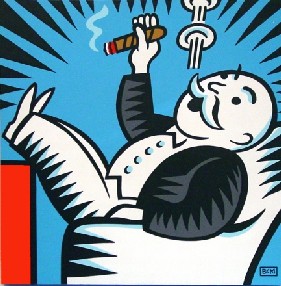The desperation people have re: improving their Pagerank seems to be largely unjustified from a technical standpoint. All evidence points to Pagerank being only one of many factors used in search ranking and a low one does not seem to be a death sentence. However like so many things in life, the perception that it has value gives it value. If everyone agreed gold was worthless, it would be, but instead perception makes it very valuable.
The manic pursuit of Pagerank, often at the expense of quality content, exposes some interesting aspects of Google’s dominance. Now, I’m not a Google-hater by any stretch of the imagination. The number of Google’s tools we use here should make that clear. I think they do good work and their tools are very helpful, however their methodology is often dangerous.
When it comes to Pagerank for example, they are intentionally vague on the way it works. Just make good content and Pagerank will follow, they tell us. While this makes sense in theory, in practice, anyone can defend why their content is “good.” However, if their motivations do not line up with what Google considers “optimal,” then there exists a disconnect that the webmaster is punished for.
Since Google is largely a monopoly, their influence on the net is huge. Moreover, as they try to combat things like spam pages, they increasingly create rules about what a “good web page” should be. I may be only speaking for myself, but I don’t think we’re to the point where we know authoritatively what constitutes a “good” web page, and I’m not sure such a day will ever come. But when Google is the “master” of the game, we all make web sites that conform to Google’s idea of “right.” This could potentially be stifling to innovation.
Basically, because Google controls much of the web, we have to make sites that will maximize us in Google’s eyes. Consequently most of the most popular websites will all be very similar. Someone with a dramatic innovation may not be able to get any “airtime” for that innovation because it does not yet fit Google’s model of a good page.
This may potentially leave room for a competitor to Google. Cuil’s less than impressive launch still showed us that the market is downright anxious for someone to show up and give Google some competition. Perhaps this is because, in the long run, people are reluctant to let Google dictate the web’s future. Google’s monopoly may in fact be a danger to everyone, including itself.



0 responses so far ↓
There are no comments yet...Kick things off by filling out the form below.
Leave a Comment